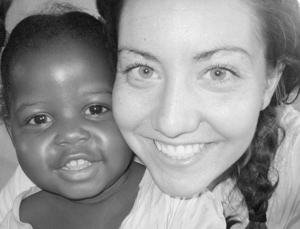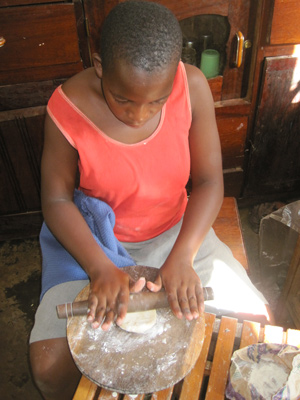Daily Donuts and Rethinking Call in Uganda
Published: April 13, 2021
Do our jobs define us? Do young people in our culture feel pressed to identify a life work or vocation? These are the questions that Hannah (Groves '13) Cowman puzzled over as she observed differences between Christians in America and Christians in Uganda. Here are her thoughts.
 Imagine yourself sitting around a dinner table engaging in conversation with guests you didnt know. Your first question likely would be, So, Jim, what do you do for a living? There is nothing wrong with this question, but its precedence in American conversation implies that our identity is wrapped up in our jobs, in our work.
Imagine yourself sitting around a dinner table engaging in conversation with guests you didnt know. Your first question likely would be, So, Jim, what do you do for a living? There is nothing wrong with this question, but its precedence in American conversation implies that our identity is wrapped up in our jobs, in our work.
This preoccupation with our identity as what we do creates confusion and anxiety for many young Christians as they seek to answer the question, What is Gods will for my life? I found myself studying abroad in the East African country of Uganda when I wrestled with this question the most. It didnt take long for me to notice that work, for many Ugandans, was a repetitive act that simply met a basic human need for each day, not one that defined them as persons.
What We Do, Not Who We AreFor example, my host sister prepares a large batch of sweet dough to make Ugandan  donuts called mendazi. After mixing, rolling, cutting, forming and frying the dough, all completely by hand (a process that takes most of the day), she sits on the floor and pours the mendazi into long plastic bags, sealing individual packages by melting the plastic in a nearby candle. She repeats this process six days a week. The profit she gains means she can send her children to school.
donuts called mendazi. After mixing, rolling, cutting, forming and frying the dough, all completely by hand (a process that takes most of the day), she sits on the floor and pours the mendazi into long plastic bags, sealing individual packages by melting the plastic in a nearby candle. She repeats this process six days a week. The profit she gains means she can send her children to school.
Many Ugandan men spend the day transporting peopleor live chickens or a new bunk bedby motorcycle. Others drive vehicles stuffed with as many people as possible (I once took a five hour bus ride next to a mom and five children who occupied only two seats).
Who God Wants Me to BeIn Uganda I discovered a new freedom to think of Gods will for my life in terms of the person God would desire me to be rather than what I do. I didnt hear my Ugandan friends wondering what job God wanted them to pursue like my American friends did. Instead I heard themes of making God known, participating in Gods work and living an obedient life. I wondered if my quest to discover Gods will was birthed out of privilege; possessing many choices and having opportunity. Perhaps asking about my life first was the wrong question.
The apostle Paul adds his voice to the discussion when he writes in 1 Thessalonians (to a church experiencing persecution and where daily work for most people consisted of manual labor): Be joyful always; pray continually; give thanks in all circumstances, for this is Gods will for you in Christ Jesus.
Sacred Work, EverydayMy experience in Uganda freed me to realize that all of us can be living in Gods will even as we perform our daily, mundane tasks. How refreshing to discover that the missionary looking after orphans is no more doing Gods will than my sister Harriet making mendazi . . . and that both acts can be holy, sacred work in the hands of a loving God. Perhaps more importantly, it frees us to realize that both individuals, alongside their brothers and sisters in Christ, are becoming the people that God designed them to be.
GC Vision: We inspire our students to embrace Gods call. Go here to share your story about calling.

